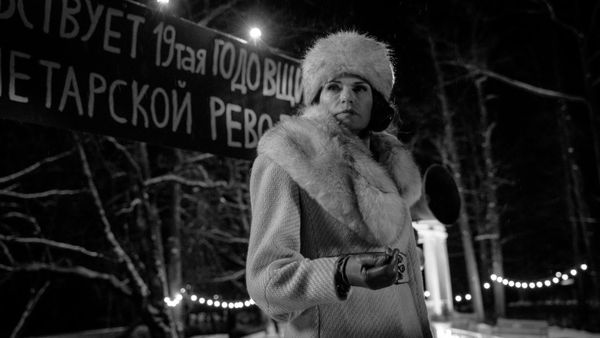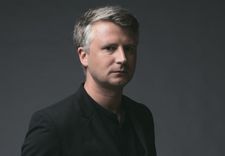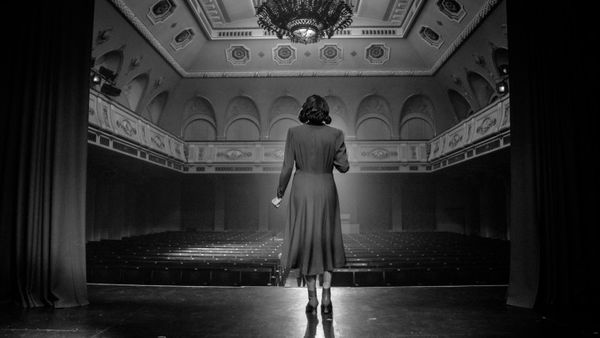 |
| Olga Sepicka as Maria. Dāvis Sīmanis: 'For me, the black and white was a kind of bridge towards silent cinema, because Maria was a silent movie star' Photo: Mistrus Media |
At the Berlin International Film Festival, Sīmanis talked about Leiko’s life, the film’s noir aesthetic and how the cyclical nature of history is perceived in reality and on the screen.
What was it about Maria's story that attracted you the most? What are some aspects that made you make a film from her story?
Dāvis Sīmanis: I was touched by her story and of course the last two years of her life. She travelled to Soviet Russia to retrieve her grandchild because her daughter died giving birth. Afterwards, she stayed in Russia to try to restart her acting career. Then she was persecuted as things got complicated. So yes, it is a very emotional story. I was at first focused on the child more than Maria. But then afterwards, I realised that she's kind of a perfect looking glass, through which you can see the dreadfulness of this particular period. And then the reality of the Ukraine war shaped the film’s ideas even more.
How did you research the story? And how did you balance historical accuracy with creative filmmaking?
 |
| Maria's Silence director Dāvis Sīmanis: 'Even today, we are still living in a time when people are losing their awareness for truly identifying evil' Photo: National Film Center of Latvia |
Can you give me an example?
DS: Sure. There is a kind of romantic story involving secret police officer Jēkabs Peterss [played by Arturs Skrastins] and Maria. We knew they were close, but we didn't have any particular proof that they had a relationship. That was something we chose to include in the film, but there are suggestions that it could be true. For example, he was known as a womaniser, having two wives at once. So, in that sense, probably he could have developed some kind of passion for Maria.
The film is shot in black and white. What inspired your decision to adopt this style and how did you approach recreating the atmosphere of 1930s Moscow?
DS: For me, the black and white was a kind of bridge towards silent cinema, because Maria was a silent movie star. But it also helped us to lose the ornamental aesthetics of cinema, because whenever you have colour, people tend to approach it differently, more optimistically. And we wanted this to be harsh. We didn’t want to give any false promises of a beautiful life.
The other thing about the overall aesthetics is that we were inspired by film noir. We used different kinds of techniques to emphasize this film noir-ish feel. Every scene was filmed in one take. We repeated them several times, but then the actors would work and develop their characters while in the scene. And that was very helpful because afterwards, we could do edits in a particular way, as we wanted.
Speaking about acting, there is a sense of improvisation within some scenes, especially when they are rehearsing the stage play. Did you offer the actors a lot of freedom? Did you improvise?
DS: We had some strict rulings on some parts of the dialogue. But of course, it was important to give a certain freedom to the actors themselves, to show what the real process of rehearsing theatre production is. Those were moments in the film where they could show me what they could do on stage instead of me telling them how to do it.
Is there a correlation between what we see behind the scenes at the theatre and what remains hidden in oppressive regimes?
DS: I think the theatre in a way is a metaphor for the whole regime. We have the facade and what happens behind the facade, which is the same way as power expresses itself. But, I think it's important to look at the responsibility of the artist in these kinds of circumstances. And I think nowadays, and in Russia more so, it's terrible that you see how many artists consciously or unconsciously play along with the regime. This aspect is something that was not initially in the film, but now, in the context of what we have seen for the last two years, has become a very strong part of it.
To silence her, the authorities offer Maria the chance to return to fame. Does complacency lead to complicity, whether in the past or the present?
DS: I think in her case, we don't know whether it was a conscious or an unconscious choice. But of course, she was part of it. She lived in comfort, separate from the other actors in the theatre. In that sense, of course, we see a very strong parallel to the silence in today’s Russia. But the difference in her is that at one point the love towards the child becomes bigger than the comfort.
How do you perceive the renewed relevance of this Stalinist-era story in light of the current Ukraine war?
DS: Whenever there is regime change in Russia, they don’t say “never again” like for example, Germany said after the Second World War. Russia always thinks of itself in some kind of glorious terms and perhaps that is a reason for history repeating itself again and again. And now we can witness a reality in which Russians raise new monuments of Stalin. So, you see that they have not blocked themselves from this horrible past. And that is why they are creating a tragic and catastrophic present, with no one to fight back. Even now, after the recent death of Alexei Navalny, very few people come out and they are being brought in by the police. There isn't really any civic society.
How do you see the connection between films that explore a tragic past and current events that unfold similarly to cinematic fiction?
DS: I think I could relate to some film scholars of the past like André Bazin and Siegfried Kracauer, who were reflecting on the fact that the screen is the reality. When we live our lives, we have all these ideological layers upon us, and only the screen can provide some kind of a truthful reality in which we can see ourselves. I think there is some kind of strange, esoteric force of cinema to predict the future in a way. Because you are making films, and it takes like three or four years. You start the project and it's about something else and then it develops more and even when the film is finished, you realise that somehow the reality shapes in the way that the film predicted.
So, I think, through the screen, we can gain a truthful reality. It is sad that sometimes the historical films that predict the future are tragic or show this kind of clash of civilisations. It’s sad because you get the sense that nobody learns anything. Even today, we are still living in a time when people are losing their awareness for truly identifying evil. And cinema should attempt to catalyse the people's ability to still be aware and to learn from our past.






















